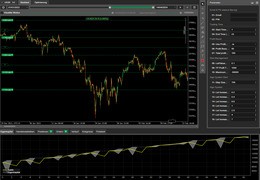Between reality and illusion If you want to know what trading really means—beyond luxury cars, piles of cash, and...
Search in blog
Blog categories
- FAQ – Your guide through the world of finance and technical facilities (2) click
- Daytrading Almanac (27) click
- Press release (23)
- Educational (26) click
- Projects (9)
- Chart analysis (39) click
- Trading bots for cTrader (11)
- AI in trading (5)
- Trading Strategien (11)
- Trading signals and stock market letters (46)
Latest posts

When it comes to traders, social media platforms often create a rather one-sided image: a young face smiling at the...

The TegasFX Instant Funding program sets a new standard for traders seeking quick access to capital without having to...

Backtesting trading strategies is an essential tool for traders who want to validate their methods across historical...

introduction In the world of trading, it can be challenging to balance the intense market activity and the rapid...
Popular posts





Featured posts





Photo gallery
No featured images
Archived posts
Top authors
-
 Christian Lill 70 Posts View posts
Christian Lill 70 Posts View posts -

-

-

-

Adapting trading strategies to volatile markets
Adaptation of trading strategies to volatile markets: strategies and tips
In an increasingly volatile market environment it is essential for traders to have flexible and adaptable strategies develop strategies that enable us to respond effectively to sudden changes Here are proven methods and tips to help you trading plan flexible and the potential of your investments also in difficult times.
1. Understand volatility
Volatility refers to the extent of Price movements of an asset over a certain period of time. In In volatile markets, prices can fluctuate significantly, which can involve both risks and also offers opportunities. It is important to understand the causes of volatility, be it due to economic events, geopolitical uncertainties or Market liquidity. Tools such as the volatility index (VIX) can help to assess the current risk level.
2. Adjustment of trading sizes
One of the most effective ways to Limiting risk in volatile times is about adjusting trading sizes. Smaller positions can spread the risk and reduce potential losses Consider implementing a scaling strategy where you enter a position in several small steps instead of one big amount at once.
3. Setting stop loss and take profit
Stop-Loss (SL) and Take-Profit (TP) Orders are essential tools to protect your capital in unpredictable markets These should be dynamically adapted to changing market conditions. For example, narrower Stop-loss orders help to reduce the risk of loss in a rapidly to limit the reversal of the market situation.
4. Diversification
Diversification is another critical Factor for risk reduction. In volatile times, it can be advantageous to invest in different asset classes, sectors or geographies to ensure the to reduce unsystematic risk. Remember that a broad Diversification across different asset classes stabilizes the portfolio can.
5. Use technical analysis
Technical analysis can be particularly useful in volatile markets as it allows you to identify patterns and trends that may not be immediately obvious. Indicators such as moving averages, RSI (Relative Strength Index) and MACD (Moving Average Convergence Divergence) can be helpful to identify entry and to determine exit points.
6. Stay informed and flexible
Information is the key to success in Trading. Always keep up to date with current market developments and global economic news. Be prepared to share your Adapt strategies when new information becomes available or when market conditions change.
7. Stress management
Finally, stress management must not underestimated. Volatile markets can be emotionally challenging and lead to hasty decisions. Develop a routine that allows Enables you to keep a cool head and act rationally.
By implementing these strategies Traders can keep their plans flexible and adapt to the constantly changing conditions of the financial markets. Remember that no plan is perfect and continuous evaluation and adaptation are required to to be successful in the long term.
Leave a comment
Related posts
 Adjustment of trading sizes
Adjustment of trading sizes
 Setting stop loss and take profit
Setting stop loss and take profit
 Diversification
Diversification
 Use technical analysis
Use technical analysis
